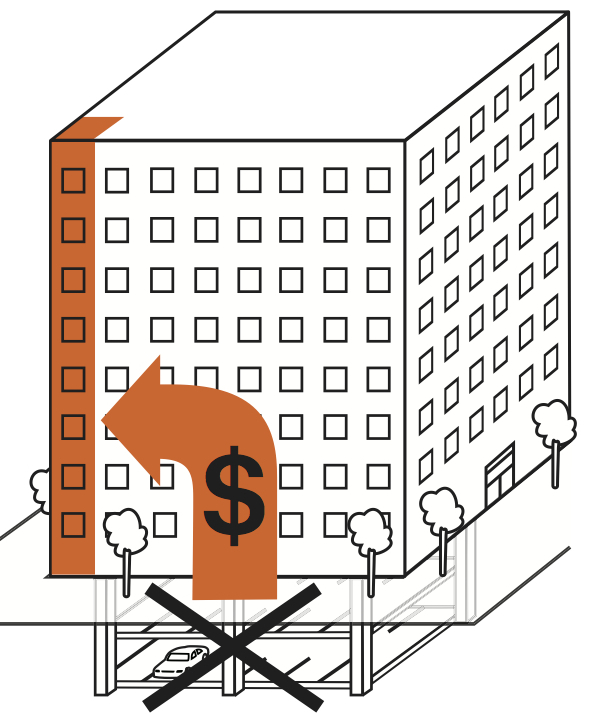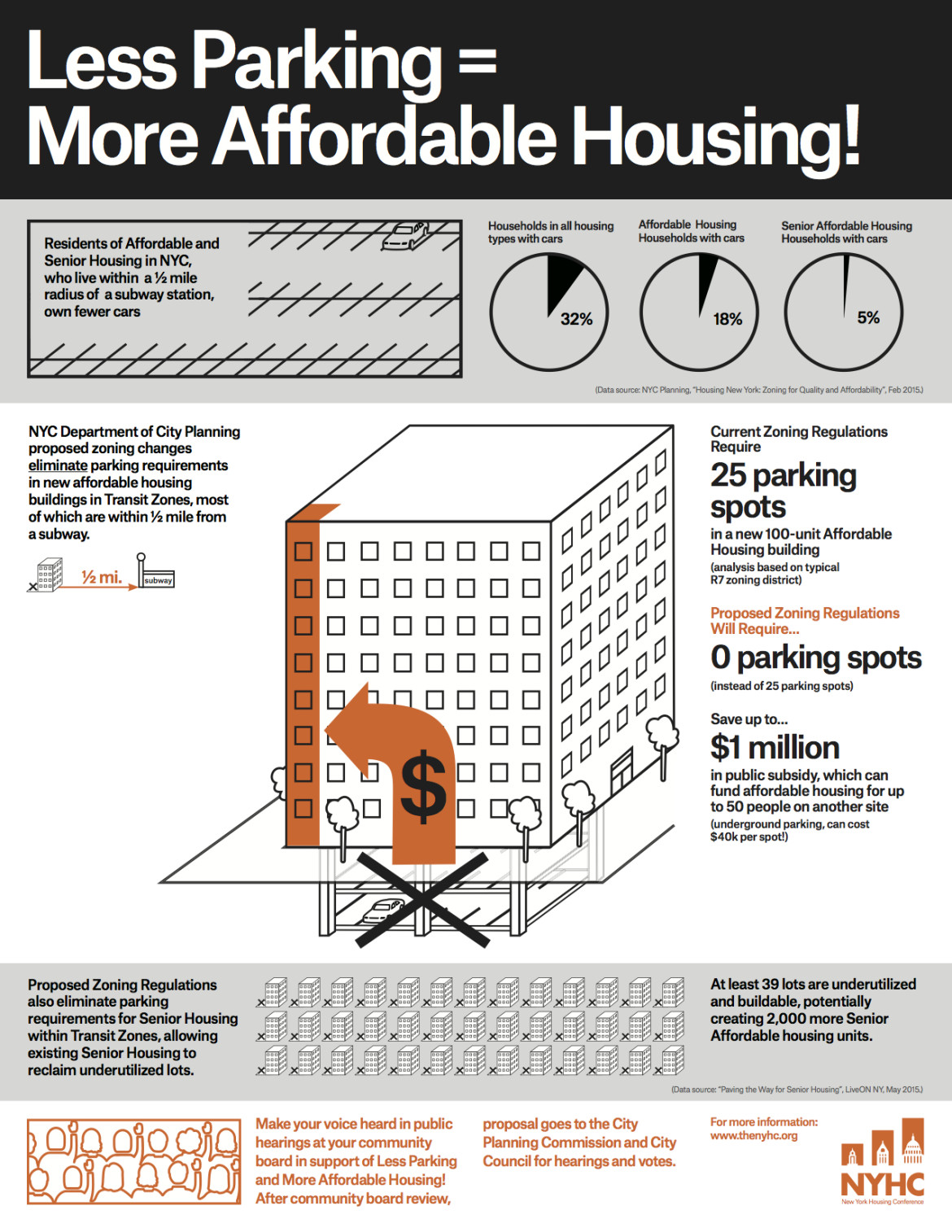
NYHC
As part of Mayor de Blasio’s 200,000-unit affordable housing plan, the Department of City Planning has proposed welcomed changes to zoning regulations to make it easier to build and preserve affordable housing. This includes eliminating parking requirements for affordable and senior housing in transit zones, most of which are within a half-mile of subways.
The New York Housing Conference, an affordable policy and advocacy organization, enthusiastically supports this change, which will save $1 million in every new 100-unit building, which is the cost to build the 25 parking spots currently required by local law as underground parking. With one in three New York City renters paying more than 50 percent of their income on rent and many in desperate need of affordable options, resources should be invested in more housing not more parking.
Also, residents of affordable housing in transit zones own far fewer cars than other households. Only 5 percent of seniors living in affordable housing in transit zones own cars. Residents and community boards should support this proposal to stop requiring parking to be built where it is not needed. The Senior Housing Coalition of LiveOn NY, an advocacy organization for older adults, recently surveyed existing parking lots owned by nonprofits and found 39 underutilized and buildable parking lots across New York City. If the new zoning proposal is adopted, these concrete lots can be converted to affordable housing for 2,000 seniors. Common-sense zoning improvements can unlock sites for affordable housing and save public subsidy.
Support reduced parking requirements by downloading the new NYHC infographic below and share it with your neighbors, community board and local council member.
Rachel Fee is the executive director of the New York Housing Conference.

NYHC









23 thoughts on “Less Parking = More Affordable Housing!”
Affordable housing is a unicorn. Bike nazis love unicorns.
The only problem is that as the residents of ‘affordable’ apartments or market rate apartments make more money they will start to purchase cars. So it’s a balancing act.
“And as the younger residents get older and get married and have kids a car becomes a necessity. Who would drag their sick child onto a bus or call a car service for an emergency doctor’s visit[?] Many residents will want a car for things like shopping and visiting out of borough and out of town friends and family.”
Given that most of the households in this city do not own cars, are you suggesting that this majority doesn’t get older, doesn’t have children, don’t visit family, don’t visit doctors, or shop? People have used public transportation to meet these needs since before the car was invented, and here, in New York, they still do. I think we’ll manage as we have for the past 150 years.
Maybe, but in NYC middle-class families are the car owners. I live on SI where a car is a necessity. But I also see tons of (very expensive) cars parked on the streets of so-called ‘transit-rich’ neighborhoods like Bay Ridge and Park Slope.
You live in a borough that has roughly 5% of the city’s population. I wouldn’t take that as indicative of the city as a whole.
Most streets in New York are covered in parked cars (drivers are like air, they’ll expand to fill all allowable space), but if a block can accommodate 80 parked cars on a block that houses 1,600 people, I don’t see how that leads you to believe that most people have cars.
Everyone thinks they’re middle class, whatever that is. Less than half of households in NYC have an automobile registered (Skewed by SI and Queens), and the average household size in NYC is 2.6 people. That means a small percentage of the population has regular access.
Considering the density of the places you mentioned, though numerous, the number of cars you see parked on the street does not correlate with the total residential population.
This is not accurate. Seniors are not going to eventually purchase automobiles at some future date after several years of living in designated housing and neither are the demographics applying for affordable housing.
These units will be located within a half mile of rail rapid transit. This isn’t even being considered on SI (or fringe Queens) at this time either.
Pingback: Today’s Headlines | Streetsblog New York City
What about parking for NYPD? Ongoing parking issues for the staff and what about teachers and parking?
Many precincts have on-street parking for cops. Some schools have parking reserved for teachers. There is a public HS near my home and the teachers park all over, but plenty of spaces available.
Police, fireman and public school administrators should not have special parking privileges.
Many precincts have on-sidewalk parking for cops. Unfortunately.
the reason the spaces are available is because Bloomberg took away everyone’s parking passes for those spots. We have one and a half blocks worth of parking, but out of maybe 20 teachers that need to park we are only allowed 10 passes for the year. Therefore we must share and we can only alternate when we can park. And so the spaces sit empty. If DiBlasio reinstates our passes we wouldn’t have to park all over and take up neighborhood spots!
One might be excused, after reading your comment, for concluding that the 54% of New York City households that do not own a car simply sit at home all day every day, since it is apparently impossible to travel anywhere without a car.
There is no reason for the city to subsidize parking for teachers. There are many ways to get around this city, and if you choose to drive to work, the responsibility to find a legal place to park your car is yours and yours alone.
Personal responsibility is a lesson that our school children should be learning, but they’re not going to learn it if their teachers haven’t even figured it out.
Andrew,
Exactly what is it you do for a living?
Argumentum ad hominem.
My reply was not to attack, but to show you that you have no idea why a teacher would want to drive to work. Most laymen have no idea what a teacher does on a daily basis and henceforth your comment!
I said nothing about an attack.
Although my job is nominally 9-to-5, I often (at least once or twice a week) have to go into the office several hours early or stay well into the evening. I also often work weekends and holidays. And I have meetings in odd locations in all five boroughs (and occasionally beyond). But none of this relieves me of the responsibility to accept the consequences of however I choose to commute to work.
I have a close friend who is a teacher who does not own a car. Somehow she does it, and she even seems to enjoy her job. You want to drive a car? Fine, drive a car, but I only ask that you accept the consequences of that choice (e.g., finding a place to park is your problem and nobody else’s). It’s called taking responsibility.
Pingback: East Harlem News - July 2015
parking garage under senior/ affordable should be increased and required to provide affordable monthly rates to limited income families, policemen, firemen, who actually park their cars on public sidewalks or street. Cars are not going away and a lot of seniors, such as myself have cars to go and visit grandchildren, supermarket, etc. It is not easy to carry groceries on the subway
At whose expense? Where? And why, given that only 5% of senior affordable housing households own cars in the first place?
Affordable to whom? Assuming “affordable” refers to something lower than the market value of the space, who exactly do you expect to subsidize your parking expenses?
Limited income families, by and large, do not own cars.
Parking a car on the sidewalk is blatantly illegal and unsafe. Are you seriously suggesting that people who choose to break the law and jeopardize the safety of pedestrians should be rewarded with discounted parking? How about we instead enforce the law? Anybody who does not want to be ticketed or towed is welcome to search for legal parking or to pick a different mode to commute to work.
Nobody every claimed they were.
And many more don’t, especially those in affordable housing. Owning a car is an expensive proposition.
If you can’t reach your grandchildren by subway or bus, taxis and car services can save the day, most likely at far lower cost than owning and maintaining a personal car. Or if there is subway service between you and your grandchildren but you can’t navigate the stairs, perhaps they should be visiting you (if they are old enough).
False dichotomy – I don’t often see groceries on the subway. Most people carry their groceries home (in wheeled carts – so-called “granny carts” – if too much to physically carry) or have the store deliver. Many supermarkets offer home delivery for free or for a small fee (far lower than the cost of owning an automobile). FreshDirect may be another option for you.
As I said, owning a car is an expensive proposition. If you can’t afford one, please don’t try to pawn off your expenses on those who have chosen to live within our means.
most people who park in garages pay a monthly parking fee
police routinely park their private and official cars on sidewalks (take a jog across New York City!!!)
Have you ever counted the cars/checked ownership parked on city provided for free parking around/by/under public / affordable housing built years ago
how come welfare people are given everything without anything in return? they can own cars, have free parking spaces, and still get their welfare checks! where is equality?
Does that monthly parking fee come anywhere close to the cost of constructing and operating that parking plus the opportunity cost for the land it occupies? If not, the rest of us are subsidizing your choice to own a car. You want more parking? Then you’re asking the rest of us to subsidize you even more.
Correct, and it’s a big problem. Rewarding the police for breaking the law will not solve the problem.
See the article to which we are commenting.
Pardon?
Equality is in expecting those who opt to own cars to take care of their own parking needs on their own dime without bothering the rest of us who opt to not own cars.